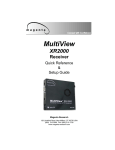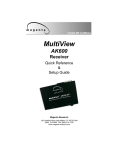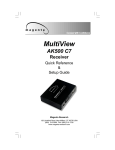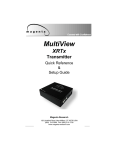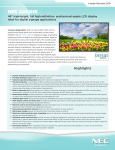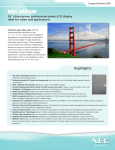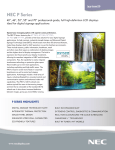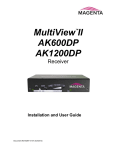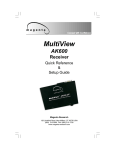Download Magenta MultiView NEC 600 Setup guide
Transcript
. Connect with Confidence MultiView NEC 600 Receiver Quick Reference & Setup Guide Magenta Research 128 Litchfield Road, New Milford, CT 06776 USA (860) 210-0546 FAX (860) 210-1758 www.magenta-research.com MAGENTA MULTIVIEW™ SERIES © 1998-2009 by Magenta Research All rights reserved. Magenta Research 128 Litchfield Road New Milford, CT 06776 USA This document and the Magenta Research products to which it relates, and the copyright in each, is the property of Magenta Research. Neither the document nor the products may be reproduced by any means, in whole or in part, without the prior written permission of Magenta Research. Magenta Research makes no warranty or representation, either express or implied, with respect to this software or documentation, including their quality, performance, merchantability, or fitness for a particular purpose. As a result, this software or documentation are licensed "as is" and you, the licensee, are assuming the entire risk as to their quality and performance. In no event will Magenta Research be liable for direct, indirect, special, incidental, or consequential damages arising out of the use of or inability to use the software or documentation. Magenta Research and the Magenta Research logo are trademarks of Magenta Research. All other brands, product names, and trademarks are the property of their respective owners. FEDERAL COMMUNICATIONS COMMISSION AND INDUSTRY CANADA RADIO FREQUENCY INTERFERENCE STATEMENTS This equipment generates, uses, and can radiate radio-frequency energy, and if not installed and used properly, that is, in strict accordance with the manufacturer’s instructions, may cause interference to radio communication. It has been tested and found to comply with the limits for a Class A computing device in accordance with the specifications in Subpart B of Part 15 of FCC rules, which are designed to provide reasonable protection against such interference when the equipment is operated in a commercial environment. Operation of this equipment in a residential area is likely to cause interference, in which case the user at his own expense will be required to take whatever measures may be necessary to correct the interference. Changes or modifications not expressly approved by the party responsible for compliance could void the user’s authority to operate the equipment. This digital apparatus does not exceed the Class A limits for radio noise emission from digital apparatus set out in the Radio Interference Regulation of Industry Canada. EUROPEAN UNION DECLARATION OF CONFORMITY The manufacturer declares that this product meets the requirements of EU Directive 89/336/EEC. CONTENTs. Contents Chapter Page 1. Specifications...................................................................................................2 2. Introduction ........................................….........................................................3 2.1 Overview................................................................................….................3 2.3 Compatible Cabling ........................................................................…...….3 3. Setup and Installation.......................................… ......................................….4 3.1 Cabling Considerations.................................................................................4 3.2 Making the Connections.....................................................................…......4 3.2.1 Connections and Setup in General .......................................……......4 3.3 Video Adjustment……..................................…...................................……...6 4. Troubleshooting...........................................................................................….8 4.1 Common Problems ..................................................................................….8 Appendix A. Cabling Pinouts.........................................…...............................…...10 Appendix B. Sync Mode…….………………………………………………………….11 Appendix C. SAP Address….………………………………………………………….12 Appendix D. Rotary Knob menu……………………………………………………….13 1 MAGENTA MULTIVIEW™ SERIES 1. Specifications Cable Required: Category 5, 5e, 6 shielded or unshielded twisted pair Compliance: CE; FCC Class A, IC Class A Video Support: all supported VESA modes to WUXGA (1920x1200), RGBHV, HDTV modes including 1080p, 1080i, 720p (Note: The NEC 600 does not support component, composite or S-video video signals) Resolution and Refresh Rate: At 600 ft. (183 m) or less: a maximum of 1920x1200 Required Source Impedance: Video OUT: 75 ohms; Audio models: Audio OUT (if any): 600 ohms maximum Required Destination Impedance: Video IN: 75 ohms; Audio models: Audio IN (if any): 600 ohms minimum Audio Characteristics: Full Stereo Line Level 600 Ohm Unbalanced Serial Characteristics: Protocol: Asynchronous; transparent to data format; 3 wire, baud rate of 9600* Connectors: Temperature Tolerance: (2) RJ-45, (1) DB9M (console only, not for SAP use) Operating: 32 to 104°F (0 to 40°C); Storage: -4 to +140°F (-20 to +60°C) Humidity Tolerance: Up to 80% noncondensing Enclosure: Steel Power: N/A—power supplied by display. There are no provisions for external power Size: 1.6"H x 6.8"W x 11.4"D (4.0 x 17.3 x 28.9 cm) Weight: 2.2 lb. (1.0 kg) *The serial baud rate may be changed internally via SAP commands (see SAP communication Protocol User Manual), however it is recommended to use 9600 baud for best performance. 2 CHAPTER 2: Introduction. 2. Introduction 2.1 Overview This manual covers the Magenta MultiView™ NEC 600 card slot CAT5 Receiver unit. The NEC 600 is intended for use only in compatible NEC displays that have the card slot feature. All signals are input directly into the display so external cabling or power is not required. The NEC 600 card slot receiver supports video, stereo audio and the SAP pollable RS232 option on a single CAT5 cable. In order to support all signals a compatible SAP series transmitter must be used. If video only is all that is necessary, any MultiView series transmitter may be used. The NEC 600 can be controlled and configured via the SAP protocol from a SAP enabled transmitter. For information on the usage of the SAP protocol, please refer to the SAP Communication Protocol user manual. A CAT5 output is included for daisy chaining. An external DB9 connector is used for console access to the receiver and is not intended for RS232 serial communication from a transmitter unit. The NEC 600 receiver also features integrated skew compensation. For information on the respective transmitter unit, please refer to the appropriate manual included with the transmitter. WARNING This equipment is not intended for, nor does it support, distribution through an Ethernet network. Do not connect these devices to any sort of networking or telecommunications equipment! 2.2 Compatible Cabling CAT5 cabling for the MultiView™ Series must be pinned to the T568B wiring specification (see appendix A). We also highly recommend that all CAT5 cables be pre-terminated and tested. Cables terminated on-site or in an existing infrastructure should be tested before use to ensure compliance with the T568B specification. Using incorrectly terminated CAT5 cables can damage the Magenta MultiView™ Series. Magenta Research products are compatible with CAT5/5e/6 data cabling as well as skew free CAT5/5e cabling manufactured for video applications. Note that some skew free CAT5 is specific to a particular vendor and is not compatible with our products. Please ensure any skew free CAT5 cable is non-proprietary prior to purchase/ installation. CAT6 cable, due to the manufacture method, can exhibit much greater skew than standard CAT5/5e and may require skew compensation beyond what the standard product offers. Please contact Magenta Research for assistance. 3 MAGENTA MULTIVIEW™ SERIES 3. Setup and Installation 3.1 Cabling Considerations • We recommend mounting and connecting all cabling to the MultiView™ Series components before applying power. • Make sure that the CAT5 cable you intend to use has been tested to comply with the T568B wiring specification (See Appendix A). 3.2 Making the Connections 3.2.1 CONNECTIONS AND SETUP IN GENERAL This section contains figures showing connections with the specific MultiView™ Series models. In general, however, the connection and setup procedure at both transmitter and receiver ends is as follows: At the transmitter end (refer to the transmitter user guide) : 1. Connect the source video to the MultiView™ Series transmitter video input port, which is an HD15 connector labeled SOURCE IN. 2. If desired, attach a local monitor via the local monitor port to LOCAL OUT. 3. Make your audio/serial connections via the 1/8” (3.5mm) audio connector, phoenix , or DB9 serial connector (transmitter model dependent). 4. Connect the CAT5 cable to the transmitter. 5. Apply power on the transmitter. The LED should light and, if there’s a local monitor attached, a video image should appear on the monitor’s screen. At the receiver end (Ensure display is powered off and disconnected from AC power): 1. Remove the left handle on the display and then remove the top option slot blank cover. 2. Insert the NEC 600 receiver into the NEC display slot and secure with the 2 screws that secured the blank cover removed in step 1 and replace the handle. 3. Connect the CAT5 cable to the UTP INPUT connection. 4. Connect the AC power and turn display on (Note that the NEC display only recognizes card slot options only from a cold start (i.e. when the AC power is first connected and the display powered on, not in standby mode). 5. To adjust video levels see Section 3.3. 6. To set the SAP address for SAP serial transmission, use the two rotary knobs. See Appendix C and reference the SAP Communication Protocol user manual. 4 CHAPTER 3: SETUP & INSTALLATION. 3.2.2 CONNECTIONS ON THE NEC600 RECEIVER Below the NEC 600 connections are detailed: Figure 3-1. Connections on the MultiView NEC 600. CAT5 input CAT5 output EQ/SKEW Adjustment & LED indicators See Section 3.3 SAP Series Option Address Settings/LED indicators. See below and Appendix C. AUX DB9 used for local receiver control and/or firmware upgrades. This is not a valid display control port. The NEC 600 card slot receiver does not have any internal jumper or switch settings for configuration. Any configuration parameters are changed via the SAP protocol (See the SAP Communication protocol user manual for information). Sync modes may be changed via the EQ/Skew/Mode knob. See Appendix B. In order to set the NEC 600 receiver SAP address for addressable RS232 usage, use the two rotary knobs labeled “SAP Address”. See Appendix C for address information. The SAP and LNK LED indicators can be used to check SAP connectivity per the following : LNK Status LED: Glowing dim: On: SAP Status LED: Red Pulse: Green Pulse: Valid connection to SAP transmitter. SAP session is active. Transmit data activity (to TX unit). Receive data activity (from TX unit). 5 MAGENTA MULTIVIEW™ SERIES 3.3 Video Adjustment 3.3.1 Cable Distance Compensation Settings In order to get the highest quality video signals from your MultiView CAT5 Video System, please follow the instructions and diagrams below: An Image Adjustment Utility is available for download from: http:// www.magenta-research.com/test Simply open in any image browser on a computer. If the image file can not be downloaded, use a utility to draw a black box on a white background. NOTE: TURN KNOB SLOWLY DURING ADJUSMENT PROCEDURE. Turning too fast may result in missing the proper EQ setting resulting in picture loss. To Reset EQ and Skew values to 0, remove AC power from the display, push and hold EQ/Skew Knob in and re-apply power to the display. 1. Push EQ/Skew knob in once so that the Mode LED is flashing white. 2. Turn the EQ/Skew knob clockwise until the shadow next to the black box just disappears. The brightness in the white area should be the same as the white area above and below the black box. The 1-4 Range LED’s will turn on for indicated cable distances. Starting from zero feet to 600 may take some time. Please continue turning the knob for best picture quality. 3. Press and release EQ/Skew knob until the mode LED is green or wait 10 seconds. Range LEDs for Skew adjustment Mode LED: Green: Normal Operation White Flashing: EQ adjust Red/Blue/Green flashing: Skew adjust Solid White: Sync Adjust Push button Adjustment Knob Figure 3-2: Adjustment locations Figure 3-3: Image Adjustment Utility—Cable Length EQ 6 CHAPTER 3: Setup and Installation. 3.3.2 Skew Compensation Settings The NEC 600 receiver features integrated skew compensation to adjust for signal timing differences due to differing pair lengths within the CAT5 cable. Using the delay signals, skew may be compensated from 2 to 65 nanoseconds in 2 nanosecond increments on each individual color pair. An image file is available to assist in these settings. See Figure 3-4 for an example. 1. 2. 3. To adjust individual colors, press the EQ/Skew knob until the desired color Mode LED is flashing. The LED color corresponds to the color channel being adjusted. Using the image utility, turn knob to add/subtract delay timing until a single vertically aligned line of red, green, blue is obtained. When complete press EQ/Skew knob until the Mode LED is green or wait 10 seconds . Not all colors will have the same delay settings. Figure 3-4: Image Adjustment Utility—Skew 7 MAGENTA MULTIVIEW™ SERIES 4. Troubleshooting 4.1. Common Problems In most cases, nearly every issue with the MultiView CAT5 Video System can be resolved by checking the CAT5 termination and making sure that it’s pinned to the TIA/EIA 568B wiring specification. However, there may be other problems that cause the system to not perform as it’s designed. Below are solutions to the most common installation errors. Problem: Solution: No video signal at the transmitter local port or at the receiver. • Check that both units are powered. • Ensure EQ adjustment is set correctly — turn knob slowly. • Make sure the CAT5 cable is terminated correctly per the TIA/EIA 568B wiring specification. • Is the display device powered on and functioning? Check to ensure display settings (resolution, refresh rate, etc) are compatible with input signal. • The NEC 600 only supports RGBHV video modes. Component, composite or S-video is not supported. This is due to the design on the option card slot interface and not the NEC 600 receiver. Problem: Solution: Poor video quality: • Have all receiver adjustments been finished (see section 3.3). • Ensure EQ adjustment is set correctly — turn knob slowly. • Check all cable connections. • The video signal’s refresh rate may be set too high. Reset to a lower refresh rate in your monitor-configuration menu. • There may be a delay skew issue. See Section on Skew. Problem: Solution: Poor audio quality: • Powered speakers are required. Make sure speaker power is ON. • Check input source levels from the source device. Make sure the audio source is not overdriven or underdriven. Problem: Solution: Serial communication doesn’t work correctly. • Are the serial devices connected properly? Are the serial parameters correct for source/destination devices? • SAP units have a default baud rate of 9600 bps and use 3 wire (TX,RX,GND) signals only. • Please refer to the SAP Communication Protocol user manual for information on using SAP series commands. 8 . Problem: Solution: “Green shift” or “green washout” on multimedia signals. The standard video/serial model is designed to function with DC coupled signals in which the black level is referenced to 0 volts. Nearly all VGA cards function this way. Some media servers, however, provide AC coupled signals and can cause a green color shift in the video. This is a result of the sync clamping on the red and blue channels of the video/serial model. For five-component (RGB/H&V) AC coupled video, the MultiView CAT5 XRTx Universal transmitter has been designed with full DC restoration capability. This problem is easily solved via a simple switch setting in the XRTx Transmitter. Please refer to the XRTx Transmitter user manual. Problem: Solution: Image has purple/blue tint Display gain may need adjustment. Older displays may have an incorrect gain adjustment setting. This requires using the remote to access the “expert mode” . Please contact NEC technical support or Magenta Research for assistance in this. Displays purchased after May 2009 should not require this. Problem: Solution: Notes on Daisy Chaining: When daisy chaining, the maximum cable distance is not increased beyond the rated distance of the receiver used. For example, an AK600 can only daisy chain within 600 ft of the transmitter. It is possible to daisy chain out of a short range receiver into a longer range receiver to increase the range. For example, over 600 ft an AK600 can be daisy chained into an AK1200 which allows for daisy chaining to 1,200 ft. • When using NEC600 SAP units, a maximum of 10 units may be daisy chained within the rated cable length of the receiver if using standard CAT5/6 or a maximum of 7 units may be daisy chained within the rated cable length of the receiver if using skew-free cable. • Note that if SA/SAP units are used for video only and the SA/ SAP option is not in use, then you may daisy chain to 12 units. 9 MAGENTA MULTIVIEW™ SERIES Appendix A. Cabling Pinouts Table A-1. T568B CAT5 pinout NOTE: The external DB9 connector is intended for console access to the receiver and does not support external SAP RS232 protocol. This connection should not be used to control the display. 10 APPENDIX B: Setting Sync modes. Appendix B. Setting Sync Mode The NEC 600 has the capability for fixed and agile sync. The default sync mode setting is for agile sync which replicates the source sync polarity signals. However some displays require a fixed sync polarity that is not possible to change at the video source. 1080P signals may also require this mode if the sync is a very narrow pulse. The following details how to change the sync polarity of the horizontal and vertical sync signal. This is only valid if sync mode is set to FIXED (Note that the transmitter must also be set to the same sync mode—see transmitter user manual. Not all transmitters support this feature). To enter Sync Configuration mode, press and hold the EQ/Skew knob for 5 seconds until the Mode LED turns solid white (not flashing). The Range LEDS (1-4) will indicate which parameter is selected and its current value. To change a value, turn the knob. To select the next parameter, press the knob. To exit , press knob until Mode LED turns green or wait 10 seconds. LED 1: Dim green = Agile Sync (default) Bright Green = Fixed Sync LED 2: Dim Green = Negative Horizontal sync polarity Bright Green = Positive Horizontal sync polarity LED 3: Dim Green = Negative Vertical sync polarity Bright Green = Positive Vertical sync polarity In normal operation, the Range LED’s also indicate which sync mode is in use: LED1: Off indicates Agile, non-fixed sync mode (default) On indicates Fixed sync mode in use. LED2: On indicates Positive Horizontal sync polarity if fixed sync is enabled. Off indicates Negative Horizontal sync polarity if fixed sync is enabled. LED3: On indicates Positive Vertical sync polarity if fixed sync is enabled. Off indicates Negative Vertical sync polarity if fixed sync is enabled. NOTE: When in Sync Configuration mode, pressing the knob past LED3 will result in all LED’s being off. This is a special video voltage offset mode that is currently not implemented. It is important that the knob not be turned when in this mode as you could change the video voltage level and affect picture quality. If this does happen, please turn the knob fully counterclockwise to restore the video voltage level to its default state. 11 MAGENTA MULTIVIEW™ SERIES Dec 00 01 02 03 04 05 06 07 08 09 10 11 12 13 14 15 16 17 18 19 20 21 22 23 24 25 26 27 28 29 30 31 32 33 34 35 36 37 38 39 40 41 42 43 44 45 46 47 48 49 50 51 52 53 54 55 56 57 58 59 60 61 62 63 Appendix C. SAP Addressing To set the NEC600 SAP address, use the two rotary address knobs on the unit. You will need to convert the decimal address desired to a hexadecimal address using the table to the right. The left knob designated H is the most significant digit, while the right side designated L is the least significant digit. For example, to set a decimal address of 90, the knobs should be set to H=5 and L=A, for a hexadecimal number of 5A. Please refer to the SAP Communication Protocol User Guide for information on usage of the SAP series commands. 12 Hex 00 01 02 03 04 05 06 07 08 09 0A 0B 0C 0D 0E 0F 10 11 12 13 14 15 16 17 18 19 1A 1B 1C 1D 1E 1F 20 21 22 23 24 25 26 27 28 29 2A 2B 2C 2D 2E 2F 30 31 32 33 34 35 36 37 38 39 3A 3B 3C 3D 3E 3F Dec 64 65 66 67 68 69 70 71 72 73 74 75 76 77 78 79 80 81 82 83 84 85 86 87 88 89 90 91 92 93 94 95 96 97 98 99 100 101 102 103 104 105 106 107 108 109 110 111 112 113 114 115 116 117 118 119 120 121 122 123 124 125 126 127 Hex 40 41 42 43 44 45 46 47 48 49 4A 4B 4C 4D 4E 4F 50 51 52 53 54 55 56 57 58 59 5A 5B 5C 5D 5E 5F 60 61 62 63 64 65 66 67 68 69 6A 6B 6C 6D 6E 6F 70 71 72 73 74 75 76 77 78 79 7A 7B 7C 7D 7E 7F Dec 128 129 130 131 132 133 134 135 136 137 138 139 140 141 142 143 144 145 146 147 148 149 150 151 152 153 154 155 156 157 158 159 160 161 162 163 164 165 166 167 168 169 170 171 172 173 174 175 176 177 178 179 180 181 182 183 184 185 186 187 188 189 190 191 Hex 80 81 82 83 84 85 86 87 88 89 8A 8B 8C 8D 8E 8F 90 91 92 93 94 95 96 97 98 99 9A 9B 9C 9D 9E 9F A0 A1 A2 A3 A4 A5 A6 A7 A8 A9 AA AB AC AD AE AF B0 B1 B2 B3 B4 B5 B6 B7 B8 B9 BA BB BC BD BE BF Dec 192 193 194 195 196 197 198 199 200 201 202 203 204 205 206 207 208 209 210 211 212 213 214 215 216 217 218 219 220 221 222 223 224 225 226 227 228 229 230 231 232 233 234 235 236 237 238 239 240 241 242 243 244 245 246 247 248 249 250 251 252 253 254 255 Hex C0 C1 C2 C3 C4 C5 C6 C7 C8 C9 CA CB CC CD CE CF D0 D1 D2 D3 D4 D5 D6 D7 D8 D9 DA DB DC DD DE DF E0 E1 E2 E3 E4 E5 E6 E7 E8 E9 EA EB EC ED EE EF F0 F1 F2 F3 F4 F5 F6 F7 F8 F9 FA FB FC FD FE FF . Appendix D. Rotary Knob Menu The following diagram details the various configuration settings available through the rotary knob. This is provided to graphically show each menu choice. Mode LED: Solid Green Press knob > 0.5sec (< 5sec) Mode LED Flashing White Range LEDs: EQ setting Mode LED Flashing Red Range LEDs: skew setting Range LEDs: skew setting Mode LED Flashing Blue Range LEDs: skew setting Normal Operation Press knob > 5sec Video EQ Adjustement Mode Configure Sync-mode: Agile/fixed Press knob > 0.5sec Press knob > 0.5sec Red-skew Adjustement Mode Press knob > 0.5sec Mode LED Flashing Green Range LEDs: config status Press knob > 0.5sec, or 10sec timeout from any menu Configure HSync-polarity: +/Press knob > 0.5sec Green-skew Adjustement Mode Configure VSync-polarity: +/- Press knob > 0.5sec Press knob > 0.5sec Blue-skew Adjustement Mode Adjust: video-offset voltage. Mode LED Solid White Range LED1: Sync-mode Status Mode LED Solid White Range LED2: HSync-polarity Status Mode LED Solid White Range LED3: VSync-polarity Status Mode LED Solid White Range LEDs: Video offset voltage setting Note: Video-offset voltage adjustment is for future use. Always set to "0". Range LED Status Display Dim: Config option = 0 (off, or de-selected) Bright: Config Option = 1 (on, or selected) 13 MAGENTA MULTIVIEW™ SERIES Magenta Research 128 Litchfield Road, New Milford, CT 06776 USA (860) 210-0546 FAX (860) 210-1758 www.magenta-research.com PN 5310229-01, Rev 01, Jul-2009
















